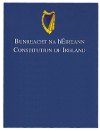The Constitutional Convention has been asked by six of the President’s seven nominees to the Council of State, to consider the  Constitutional requirement for judges and other office holders to take religious oaths .
Constitutional requirement for judges and other office holders to take religious oaths .
In a submission made to the Convention on Monday, the six said that the issue “came to our attention recently at the first meeting of the Council of State called by President Higgins”.
Currently, article 31.4 of the Constitution reads: “In the presence of Almighty God I . . . do solemnly and sincerely promise and declare that I will faithfully and conscientiously fulfil my duties as a member of the Council of State.”
The submission says that the six members of the Council were “conscious of the increasing diversity of our society today compared with society at the time the Constitution was adopted”.
The submission says: “This increasing diversity requires changes in some aspects of the Constitution to more positively accommodate and make welcome a wider range of viewpoints, belief systems and backgrounds.
“We were prompted to raise this issue because it specifically affected the body to which we have had the honour to be appointed, but we are aware that the Constitution requires similar declarations to be made by the President him or herself and all members of the judiciary.
“We feel that similar considerations to those we have raised in relation to the Council of State should apply to these positions as well.
“In relation to the judiciary in particular, we feel that in our increasingly diverse society it is important that no person of any religious belief or none should feel that their particular viewpoint is excluded from representation among the judiciary by reason of the type of declaration required.
The submission was made by former Supreme Court judge Catherine McGuinness; solicitor Michael Farrell; community activists Sally Mulready and Ruairí McKiernan; academic Prof Deirdre Heenan, and disability law expert Prof Gerard Quinn.
It adds: “The respect due to religion and to those who profess religion is of course sacrosanct. But to require a citizen to publicly profess a faith – any faith – as a precondition to enter and hold public office serves neither religion nor the ideal of a public space open to all who are willing to contribute to the common good in a Republic.”
They said they were approaching the issue “from the perspective of what it means to take seriously the Republican form of Government . . . We are also conscious of the increasing diversity of our society today compared with society at the time the Constitution was adopted”.
The requirements of article 31.4 “could exclude or cause embarrassment to atheists, agnostics and humanists. It could also be unacceptable to Quakers and other Christians who do not approve of religious oaths, and to members of some other non-Christian faiths”, they said.
They further noted that “the Constitution requires similar declarations to be made by the President him or herself and all members of the judiciary” and that this too should be considered by the convention. The courts “already allow witnesses and members of juries to choose between taking a religious oath, under various forms, and making an affirmation with no religious references”, they said.
The Council of State, which offers advice to the President when asked, comprises the appointed members, and senior office holders, including the Taoiseach and Chief Justice, as well as former such office holders and former Presidents.















